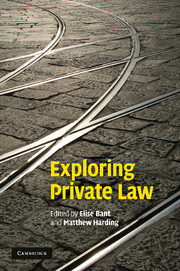Book contents
- Frontmatter
- Contents
- List of Contributors
- Foreword
- Acknowledgments
- Table of Cases
- Table of Legislation
- Introduction
- I Method
- II Unjust enrichment
- III Equity and trusts
- 11 What is left of equity's relief against forfeiture?
- 12 Contracts, fiduciaries and the primacy of the deal
- 13 Four fiduciary puzzles
- 14 Good faith: what does it mean for fiduciaries, and what does it tell us about them?
- 15 Trustees' duties to provide information
- IV Remedies
- Index
- References
11 - What is left of equity's relief against forfeiture?
Published online by Cambridge University Press: 10 November 2010
- Frontmatter
- Contents
- List of Contributors
- Foreword
- Acknowledgments
- Table of Cases
- Table of Legislation
- Introduction
- I Method
- II Unjust enrichment
- III Equity and trusts
- 11 What is left of equity's relief against forfeiture?
- 12 Contracts, fiduciaries and the primacy of the deal
- 13 Four fiduciary puzzles
- 14 Good faith: what does it mean for fiduciaries, and what does it tell us about them?
- 15 Trustees' duties to provide information
- IV Remedies
- Index
- References
Summary
All law students learn about equity's jurisdiction to relieve against forfeiture. Suppose a purchaser has paid 90 per cent of the instalments on a diamond necklace, but defaults on the final instalment. Should the vendor be able to terminate the contract for breach and keep both the necklace and the instalments? Many would think that result patently unfair, and that the law should protect the purchaser from ‘forfeiture’ of the necklace, or at least from ‘forfeiture’ of the instalments already paid. But is the outcome unfair? Or, more pointedly, is it always unfair? Does it make any difference that the contract is for a necklace rather than for some other benefit? Or that 90 per cent rather than 5 per cent of the instalments have been paid? Or that the purchaser is never going to be able to find the additional money? Or that the contract itself expressly provides for termination and forfeiture, and has been freely negotiated between competent parties? And if the outcome is unfair, which of the ‘forfeitures’ should be remedied? Is the proper solution to give the purchaser extra time to find the final instalment and complete the contract (also paying for any consequential damage to the vendor because of the delay), so that she gets her necklace, or is it to allow the vendor to terminate the sale agreement but compel him to return the instalments? These are the puzzles in ‘equity's relief against forfeiture’.
- Type
- Chapter
- Information
- Exploring Private Law , pp. 249 - 274Publisher: Cambridge University PressPrint publication year: 2010



